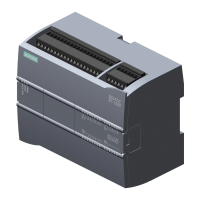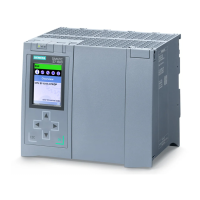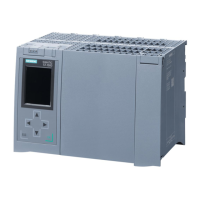PLC concepts
5.1 Execution of the user program
S7-1200 Programmable controller
System Manual, V4.2, 09/2016, A5E02486680-AK
115
● Creating a backup of the CPU
● Restoring the CPU configuration
The CPU supports a time-of-day clock. A super-capacitor supplies the energy required to
keep the clock running during times when the CPU is powered down. The super-capacitor
charges while the CPU has power. After the CPU has been powered up at least 24 hours,
then the super-capacitor has sufficient charge to keep the clock running for typically 20 days.
STEP 7 sets the time-of-day clock to system time, which has a default value out of the box or
following a factory reset. To utilize the time-of-day clock, you must set it. Timestamps such
as those for diagnostic buffer entries, data log files, and data log entries are based on the
system time. You set the time of day from the "Set time of day" function (Page 1316) in the
"Online & diagnostics" view of the online CPU. STEP 7 then calculates the system time from
the time you set plus or minus the Windows operating system offset from UTC (Coordinated
Universal Time). Setting the time of day to the current local time produces a system time of
UTC if your Windows operating system settings for time zone and daylight savings time
correspond to your locale.
STEP 7 includes instructions (Page 338) to read and write the system time (RD_SYS_T and
WR_SYS_T), to read the local time (RD_LOC_T), and to set the time zone
(SET_TIMEZONE). The RD_LOC_T instruction calculates local time using the time zone and
daylight saving time offsets that you set in the "Time of day" configuration in the general
properties of the CPU (Page 170). These settings enable you to set your time zone for local
time, optionally enable daylight saving time, and specify the start and end dates and times
for daylight saving time. You can also use the SET_TIMEZONE instructions to configure
these settings.

